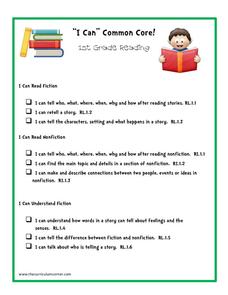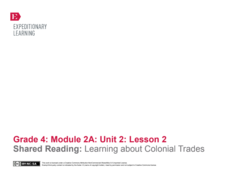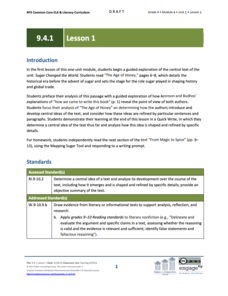DePaul University
The Working Tools of Insects
The animal kingdom is full of interesting organisms that have unique ways of surviving. Children read about different insects that have special tools for building homes and protecting themselves. When finished, learners identify the main...
DePaul University
Egypt
The country of Egypt is more than just big pyramids and ancient pharaohs. After reading a brief overview of this African nation, young learners will demonstrate their understanding of the text by identifying the main idea and supporting...
DePaul University
Settlement
Early settlers in the American Midwest experienced constant struggle. This reading passage describes for young learners the hardships of homesteaders as they journeyed west and sought to start a new life. When finished, students identify...
EngageNY
Introduction: The Ideas of Charles Darwin
Piece by piece ... Scholars read the text World without Fish by breaking the text into pieces. They identify challenging words and determine the gist of each section as they read. They then work together in triads to answer...
Curriculum Corner
“I Can” Common Core! 3rd Grade Reading
Third grade readers are given clear learning goals with this Common Core checklist. By turning each reading standard into an I can statement, children can focus on mastering the required grade level skills.
Curriculum Corner
"I Can" Common Core! 1st Grade Reading
This series of printable I can statements breaks down first grade Common Core reading standards into child-friendly terms. A great resource for providing clear learning objectives for young readers.
EngageNY
Shared Reading: Learning About Colonial Trades
Trading in Colonial America is the focus of a lesson plan that boosts reading skills. As a class, scholars examine the informational text for crucial details, use their newfound knowledge to share information with their peers, and write...
EngageNY
Close Reading: Excerpt 2 of “The Digital Revolution and the Adolescent Brain Evolution”
Help scholars comprehend a challenging text. Using the resource, pupils read excerpts from an article about the digital revolution and adolescent brain development. As they read, they answer text-dependent questions and complete a close...
ReadWriteThink
Captioning the Civil Rights Movement: Reading the Images, Writing the Words
Scholars boost their knowledge of the Civil Rights Movement with a lesson that challenges writers, readers, and historians to analyze primary sources and caption their observations. By way of reading, writing, discussion, independently,...
Core Knowledge Foundation
Colonial Towns and Townspeople Tell It Again!™ Read-Aloud Anthology
A read-aloud anthology focuses on colonial towns and townspeople. Over three weeks, young scholars listen to stories, participate in discussions about town life, practice word work, and complete an extension activity with each lesson.
EngageNY
Grade 9 ELA Module 4, Unit 1, Lesson 1
How do writers introduce and develop the central ideas in a text? To answer this question, ninth graders closely examine "The Age of Honey," the opening chapter in Marc Aronson and Marina Budhos' Sugar Changed the World: A Story of...
Mark Twain Media
Understanding Informational Text Features
Everything you need to know about informational text features can be found in this resource. Recognizing these types of text features and how they are used in text allows readers to better understand information. Teachers can use this as...
Curated OER
Nonfiction Genre Mini-Unit: Persuasive Writing
Should primary graders have their own computers? Should animals be kept in captivity? Young writers learn how to develop and support a claim in this short unit on persuasive writing.
National Council of Teachers of English
Writing Acrostic Poems with Thematically Related Texts in the Content Areas
Scholars scour thematically aligned texts to gather a bank of words they can use in an original acrostic poem.















